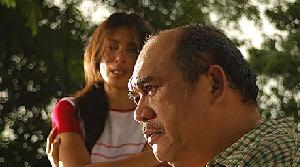
Kaleldo (Brillante Mendoza, 2006)
English Title: Summer Heat
The opening titles of Brillante Mendoza's sophomore effort Kaleldo (Summer Heat) gives the backdrop of the film. Rudy Manansala (Johnny Delgado) is the widowed father of three daughters whose woodcarving business has suffered a downfall due to the eruption (and the resulting lahar flooding) of Mt. Pinatubo. He strives to bring back his woodcarving business. Through the three summers succeeding the marriage of one of her daughters, Mendoza tries to paint a portrait of a family striving to maintain its balance ten years after the life-altering eruption of the volcano.
The film formally opens with the wedding ceremony of Grace (Juliana Palermo) and Conrad (Lauren Novero). Imperfections and mistakes haunt the wedding --- a guest's car malfunctions just outside the church, the barong tagalog of Rudy is torn from the backside, the church's sound system is not working properly, among several others. Despite the facade of happiness that the celebration brings, it seems that something else is brewing within the mindsets of the guests. Grace has just married to a richer family (the mother brought her son a separate dish since she doesn't approve of the food prepared by Grace's family) who seem to disapprove of the provincial lifestyle of the Manansalas as compared to their more affluent traditions.
Mendoza divides the events that ensue after Grace's wedding into three portions; each portion is entitled to an element appropriate to the general emotions rampaging the subject daughter. The first episode is entitled "Wind" and takes Grace's experiences as the wife of a maternally doted Conrad. It seems that Grace's experiences within the Manansala family (being the least favored and the youngest; she was enrolled in a provincial computer school when her other sisters were enrolled in private schools) has been carried on within the family of Conrad wherein despite being the wife of the only son, she is treated lower and like a necessary nuisance to the in-laws' family. The second episode is entitled "Fire" and examines the failing marriage of Lourdes (Angel Aquino) with her husband Andy (Allan Paule). Lourdes' need to help the father's livelihood leads to her infidelity, which culminates in a fiery encounter that forever wounds the marriage. The last episode is entitled "Water" and focuses on Jesusa (Cherry Pie Picache) and her relationship with Weng (Criselda Volks) which also coincides with the death of the Manansala patriarch.
Kaleldo can be primarily described as overly indulgent. Masahista (The Masseur, 2005), Mendoza' first feature which was shot in digital video, is a tale of masseur-hustlers in the outskirts of Pampanga. Mendoza has approached the topic with a clinical (nearly anti-septic) approach that burdens the minuscule story with much style and technique and less of humanity. Mendoza seems to acknowledge such clinical direction (I'd like to call his style as cinematic distillation --- the inappropriate removal of spots and imperfections in favor of technical fervor, which somehow distills humanity and pathos from the story) as the proper direction for his early career and appropriates it to this tale of muted emotions within the striving family. For me, its quite problematic. With all its visual splendor (the film is really beautiful and turns the sandy plains of Pampanga into a colorful and lively setting) and proficient acting, Kaleldo appears to me as a mere folly rather than a gorgeous drama of erupting emotions and grandiose encounters.
The narrative is turned blunt by Mendoza's need to make a gorgeous film. He consistently places images of vegetation being swayed by the wind, fires and crimson blood spreading in water, and the downpour of rain (of course, appropriated in the episodes) in the middle of scenes, which further complicates the film's erratic pacing. Furthermore, there seems to be a desperate need for Mendoza to make an "art" film which doesn't really suit the thickly layered story he is trying to tell. He places images of wonderful colors, pretty framings, and curiously injected scenes of culture and tradition (the Catholic self-flogging makes an appearance, along with the santa cruzan, and other distinctly Filipino events) within the narrative framework, which simply does not jive or give further depth to the film. Simply put, Kaleldo is indeed lovely and joyous to look at, but in the end, there's really not much there. Mendoza is only successful in draping the deserts of Pampanga with art film gloss, and nothing more.
0 comments:
Post a Comment